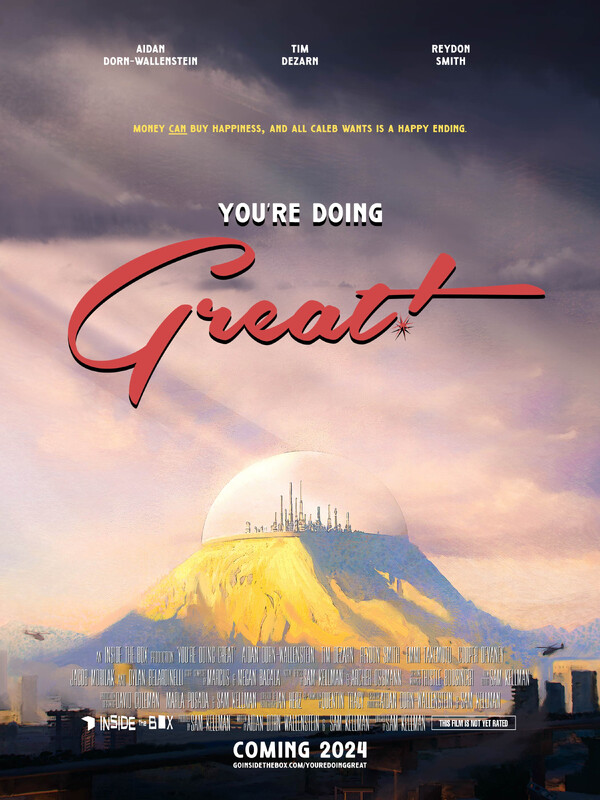
DIRECTOR AND WRITERS OF
Can you discuss the world-building process for creating the kitschy future setting of the film, where happiness is commodified? What visual and narrative elements did you use to establish this dystopian world?
SAM: The world-building process was without a doubt the most fun part of developing the film from both a writing and production design standpoint. It was decided very early on that Aidan and I wanted to go with a fantastically retro-futuristic aesthetic— very akin to 1950s and 60s (with a dash of early 70s) views of the future. Back in those days, the design language tethered to the concept of future society had such a pure optimism about it, and so we knew that would be just the right visual wheelhouse to set this story in. Not only did it give the film a unique look compared to most other dystopian projects (subbing out the typical dark grays and blacks for much brighter, more vibrant colors), but these choices also added to the irony that most all of the darkly comedic moments in the film stem from: that this place that promises to be all of these idyllic, beautiful things can only deliver on a small fraction of them, and you've better have lots of money to indulge in any of it. Hmmm, sounds sort of familiar, doesn't it? Maybe that's just me. A huge inspiration for not only the overall design language, but lots of our initial visual gags as well, was Walt Disney's EPCOT. Though we know it today as a futuristically-themed Floridian theme park, Disney's initial plans before he died were for it to be a full-blown city, and something about that just sort of creeped us out. We wondered, "What would this candy colored, corporately-owned theme park of a society built on the promise of building yesterday's optimistic tomorrow look like once it reached a point of civil unrest?" That was both extremely unsettling and extremely funny to us as writers, and was a big turning point in solidifying the tone of the screenplay.
How did you prepare for the role, particularly in understanding the emotional complexities of the character? Can you discuss the commentary on consumerism and the pursuit of happiness that your script aims to convey?
AIDAN: The preparation was a lot of work. For the months leading up to it I really tried to take off my writer hat and get immersed into the character. I guess that wasn't too hard because most of my life has been spent being an actor and writing/filmmaking is a much newer passion. Part of it was physical. Developing a posture and a way I held myself that felt like it fit the way Caleb tries to adapt to the world around him. That aided me a lot in feeling who this guy is. Then I slowly layered in the backstory and nuances of what Caleb's experiencing. In some ways, with me being a part of the character's conception, it was easy for me because I'd already decided who this guy was and what he's been through whilst writing the story. But on the flip-side of that, it was also difficult to play a character I'd created. As for the consumerist commentary, I suppose it's pretty self-explanatory. I think Sam and I were just interested in a very human thing that's in all of us: a burning and insatiable desire for happiness. I mean, it's even in the United States constitution. "The pursuit of happiness." It's a very American thing I suppose. But the irony of it all is the more you pursue happiness the more it escapes you. A lot of people prey on that. And that's what our film's trying to portray.